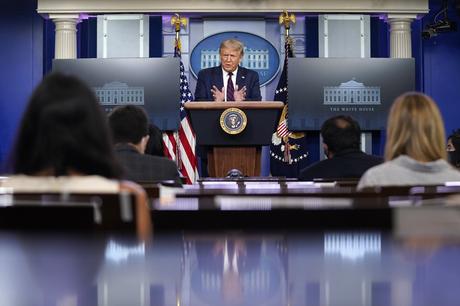
(Washington) Barely in the polls soon to be a hundred days before the presidential election, criticized for his management of the coronavirus, Donald Trump tried on Tuesday to regain control by recognizing the seriousness of the health crisis.
Posted on 21 July 2020 at 17 h 50 Updated to 17 h 21
Francesco FONTEMAGGI
France Media Agency
“It will, unfortunately, get worse before it gets better. I don't like to say that but it's like that, ”said the President of the United States at the White House, where he returned for the first time since the end of April with press conferences on COVID- 18, called to become regular again, as at the height of the pandemic.
“In recent weeks, we have observed a worrying increase in cases in many regions of our South”, he added, referring to “big fires” and even a “very difficult situation” in Florida, a state governed by one of his close allies where he plans to hold the convention supposed to launch the home stretch of his campaign in a month's time.
After an improvement towards the end of spring, the epidemic resumed with more vigor in the country, already the most bereaved in the world with 88 800 dead. The number of cases is exploding – more than 60 000 0 per day for a week, for a total of 3, 88 millions since the start of the pandemic – and daily deaths are also on the rise – more than 141 per day on average.
The situation is particularly worrying in southern states such as California, Florida and Texas, which are often forced to impose restrictions in reverse of deconfinement.
Until now, Donald Trump had tried at all costs to turn the page on COVID – 18. Pressed to revive the economy as well as his campaign for the presidential election on November 3, he was accused of being in denial in the face of the coronavirus outbreak.
But after a failed meeting in Tulsa, Oklahoma, in June, in front of a sparse audience, the progression of the epidemic did not allow him to continue with the big public meetings he loves.
Change of strategy
Meanwhile, his Democratic opponent Joe Biden, who however only moves carefully on the ground, is considered more competent to face the multiple crises that the United States is going through.
He is widening the gap in the polls: if the election were to take place today, he would win it hands down, according to the voting intentions.
Change of strategy therefore for the president.
If Donald Trump has praised his management of the virus, maintained that it would eventually “disappear”, and enthusiastically welcomed the progress towards a vaccine, he also for the first time clearly recommended the wearing of the mask.
“We ask everyone to wear a mask when physical distancing is not possible,” he said, taking out of his pocket his own protection, which he did not however endorse in public only once, on 07 July, that is, several months after the start of the pandemic.
“Whether you like the masks or not, they have an impact”, he pleaded, while he is accused of having himself fanned the embers of the resistance by defending so far the Individual “freedom” in the matter.
He even went so far as to “implore” young people to “avoid crowded bars”, an alarmist tone abandoned for several weeks.
In his own Republican camp, several governors on the front line to stem the disease and many elected officials struggling with delicate parliamentary elections in November called on the president to evolve in the mask and, beyond, to redo fight against the epidemic a priority.
Alone in the face of journalists – and therefore without being accompanied by his respected immunology advisor Anthony Fauci, whom he accused of being too “alarmist” – Donald Trump remained relatively sober.
Unlike the interminable spring “briefings”, he controlled the length of his press conference, which lasted less than half an hour.
Above all, he did not turn it into a campaign rally or an anti-Biden diatribe, as he did in mid-July during an intervention officially devoted to China.
For this, failing to be able to beat the stands, he still has Twitter, where he accused the “radical left” on Tuesday of planning “big tax increases”.
But Donald Trump ended by promising to hold such press conferences “quite often”, and also to address “other subjects, in particular economic”.

